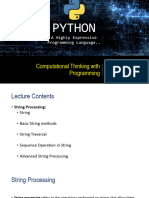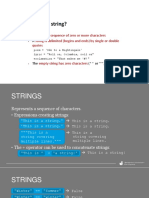Strings in Python
Uploaded by
wthyq3023Strings in Python
Uploaded by
wthyq3023"!
txt = "The best things in life are free
print("free" in txt)
print(len(txt))
"!txt = "The best things in life are free
:if "free" in txt
print("Yes, 'free' is present.")
Slicing
You can return a range of characters by using the slice syntax.
"!b = "Hello, World
print(b[2:5])
Get the characters from the start to position 5 (not included):
b = "Hello, World!"
print(b[:5])
Get the characters from position 2, and all the way to the end:
b = "Hello, World!"
print(b[2:])
Negative Indexing
Use negative indexes to start the slice from the end of the string:
Example
Get the characters:
From: "o" in "World!" (position -5)
To, but not included: "d" in "World!" (position -2):
b = "Hello, World!"
print(b[-5:-2])
The upper() method returns the string in upper case:
a = "Hello, World!"
print(a.upper())
The lower() method returns the string in lower case:
a = "Hello, World!"
print(a.lower())
Remove Whitespace
Whitespace is the space before and/or after the actual text, and very
often you want to remove this space.
Example
The strip() method removes any whitespace from the beginning or the
end:
a = " Hello, World! "
print(a.strip()) # returns "Hello, World!"
The replace() method replaces a string with another string:
a = "Hello, World!"
print(a.replace("H", "J"))
The split() method returns a list where the text between the
specified separator becomes the list items.
The split() method splits the string into substrings if it finds
instances of the separator:
a = "Hello, World!"
print(a.split(",")) # returns ['Hello', ' World!']
You might also like
- PT BR Py4Inf 06 Strings To Be TranslatedNo ratings yetPT BR Py4Inf 06 Strings To Be Translated31 pages
- Strings: Python For Informatics: Exploring InformationNo ratings yetStrings: Python For Informatics: Exploring Information31 pages
- Python Strings - Jupyter Notebook_6770056aea38477678495bc5501378b2No ratings yetPython Strings - Jupyter Notebook_6770056aea38477678495bc5501378b27 pages
- 3module 2-Python Strings, Manipulation, Accessing, OperationsNo ratings yet3module 2-Python Strings, Manipulation, Accessing, Operations35 pages
- IPP-M3-C2-Manipulating Strings_5459_BPLC15B_11-01-2025No ratings yetIPP-M3-C2-Manipulating Strings_5459_BPLC15B_11-01-202524 pages
- Strings: Python For Informatics: Exploring InformationNo ratings yetStrings: Python For Informatics: Exploring Information31 pages
- Learn Python 3 Strings: Escaping Characters in A StringNo ratings yetLearn Python 3 Strings: Escaping Characters in A String8 pages
- Thermodynamics 2ND Level Power Elect - MachinesNo ratings yetThermodynamics 2ND Level Power Elect - Machines3 pages






























































